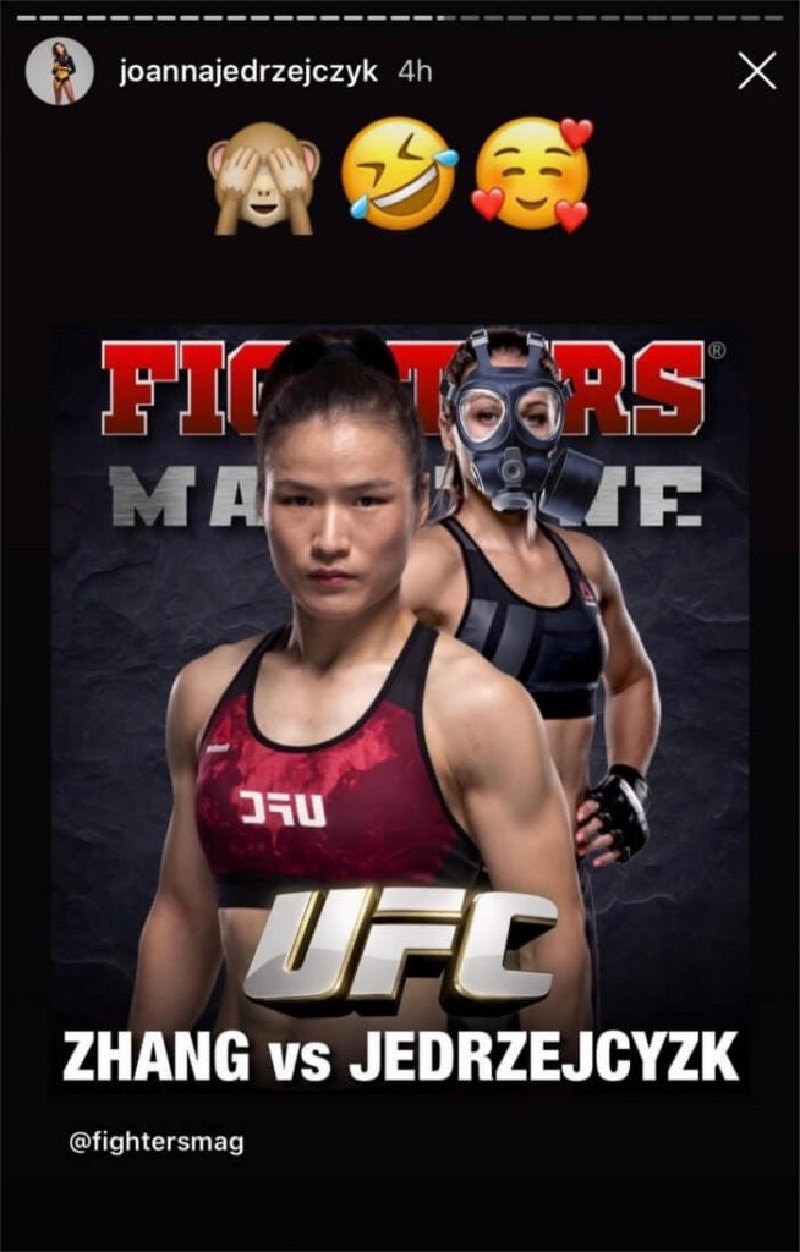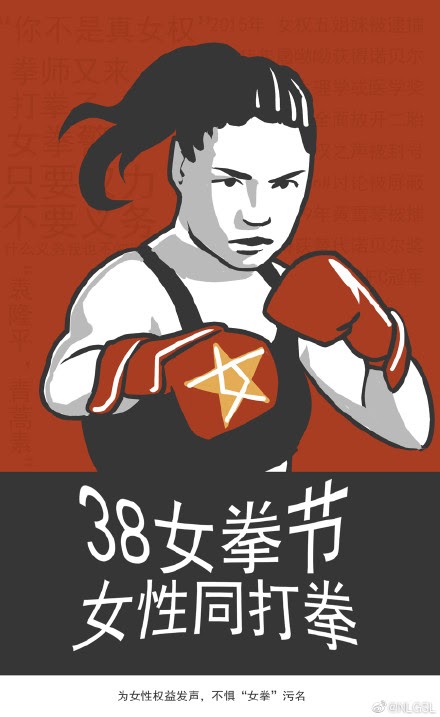How coronavirus, nationalism shaped the Zhang Weili vs. Jedrzejczyk epic
How coronavirus, nationalism shaped the Zhang Weili vs. Jedrzejczyk epic

In the professional fight world, where hype is important and drama sells, it can sometimes be hard to tell when someone has crossed a line. “There’s no such thing as bad publicity” is a mantra especially true here, particularly in the age of social media, with loudmouths like Conor McGregor at the top of the earnings charts.
But in Zhāng Wěilì’s 张伟丽 feud with Joanna Jedrzejczyk, there was one subject that was decidedly off-limits for the Chinese fighter: COVID-19.
“Say what you want about me if it makes you feel stronger but do not joke about what’s happening here,” Zhang wrote on her Instagram on January 29, addressing her opponent. “I wish you good health until March 7th.”
One day earlier, Jedrzejczyk had lit the fuse when she shared an Instagram Story of an image of her standing next to Zhang with a gas mask photoshopped onto her head. According to NextShark, the image, accompanied by three emojis from Jedrzejczyk, was created by Fighters Magazine, a Spanish-language Instagram account dedicated to MMA news. In the original post, the photo is captioned “La segurida ante todo”: Safety first.
In direct response, Zhang, the first UFC champion from China, replied: “To make fun of tragedy is a true sign of ones character. People are dying, someones father, someones mother, someones child. Say what you want about me if it makes you feel stronger but do not joke about what’s happening here. I wish you good health until March 7th. I will see you soon.”
The offensive meme was deleted, with Jedrzejczyk apologizing in a subsequent post:
Hey, champ, hey Weili, so sorry to make you feel bad, but I would never make fun of sick people with illness or virus. So I didn’t want you to get offended. But I just made fun of the funny internet meme. So, so sorry. Still, I will see you March 7. And don’t get emotional, OK?
Zhang didn’t get emotional. But one gets the feeling she fumed, silently. “I might not have pushed myself or prepared as hard if not for the coronavirus,” Zhang said in the days leading up to the fight. “China is going through a very tough time now, but everybody is doing their job. I did my job to make this happen and I believe winning will be great motivation for my country. I’m doing this for my people.”
Tensions in the lead-up
In February, as the coronavirus outbreak continued to worsen in China, Zhang flew to Thailand to avoid potential travel restrictions. But when the virus spread there too, the Chinese fighter had to make her way to Abu Dhabi, where she spent roughly two weeks awaiting clearance to enter the U.S.
“Due to the virus in China, it made it way harder than it used to be,” Zhang told sports streaming service DAZN. “I had to get used to the jet lag — Thailand is two-hour difference from Beijing…and then to Abu Dhabi. The weather and temperature is really different in each place: Beijing is cold, Thailand is hot and humid, Abu Dhabi is hot and dry. That made me feel — the whole camp — very tiring. The only time I could rest is on the airplane.”
On February 21, the Chinese champion finally arrived in the U.S. “We made it to America. We are ready. Always ready. See you soon Las Vegas,” Zhang wrote on Instagram.
There, drama awaited. During Zhang’s open workout on March 4, a group of Jedrzejczyk’s fans harassed the Chinese fighter by holding a Polish national flag and yelling “coronavirus.” In videos that circulated online, Zhang can be seen giving the middle finger to her opponent’s supporters in the middle of her session. According to Zhang’s manager Brian Butler, the tensions were so high that UFC security was forced to take action and address the fans.
Why was @joannamma Jedrzejczyk so upset at champ Zhang Weili at #UFC248 media day faceoffs in Las Vegas? It appears this disrespect of the Polish flag at Wednesday's open workouts played a role.
Read more: https://t.co/KUAQKGde9b pic.twitter.com/cneVLSD4iU
— MMA Junkie (@MMAJunkie) March 6, 2020
The next day at the pre-fight media day, Jedrzejczyk got in Zhang’s face and, as MMA Junkie noted, got a little spicier than usual.
“What you have done yesterday to my fans, you never do that. You don’t fuck with Polish Nation. But you never knew that. And, I will outclass you on Saturday, I promise you. You’ve never faced someone like me!” Jedrzejczyk said to Zhang (video below).
After Zhang told her to “shut up,” the Polish fighter made fun of Zhang’s limited English proficiency. “This is all that you know? I will shut your mouth with my fists.”
Zhang ignored her trash talk while posing for photos.
UFC 248 in Las Vegas
On March 7, in what’s being heralded as one of the best bouts in UFC history, Zhang retained her title in a split-decision victory over Jedrzejczyk. As The China Project’s sports columnist noted, Zhang and Jedrzejczyk put on five rounds of savage fighting, with both of them giving it everything.
Neither women played it safe in the final round, even as blood ran out of Zhang’s nose while Jedrzejczyk’s head swelled to alien proportions. Neither would have looked out of place in a Rocky movie. It was Zhang who found a second (or third, fourth) wind. Amazingly, even in Round 5 — which Zhang had never been to before — the Chinese star maintained her striking form, even catching Jedrzejczyk with a sweet left hook across the nose.
In a post-match interview, Zhang said through a translator, “It took us a long time to get here because of the coronavirus back in our country, everybody knows that. It was very serious but we made it. The coronavirus is getting much better. I hope everyone stays together, we come together, we fight together, we can win this. Our country is suffering from a big tragedy right now. We’ll fight together and we’ll win it.”
She also gave credit to her opponent in an Instagram post the next morning: “I respect each of my opponents. Other people’s failure will not make me happy. My confidence is built on my training and my team. @joannajedrzejczyk is a very powerful martial artist. In the end, the octagon does not need garbage, we worked together and the battle was great.”
Chinese reactions
While some fight fans suggested Jedrzejczyk got what was coming to her, Zhang’s win made headlines within China for all the predictable reasons. Many praised the fighter for showing China’s strengths through her deadly punches. As of March 10, on Weibo, the hashtag #张伟丽成功卫冕# (“Zhang Weili successfully defended her title”) had racked up about 500 million views. “Just like China, Zhang Weili had no time for petty jabs. She proved herself using her fists,” a Weibo user wrote (in Chinese).
Meanwhile, many on the Chinese internet rushed to label Zhang a “real” feminist icon because she proved her “value” as a woman by breaking gender stereotypes and bringing glory to the country. “Zhang Weili embodies true feminism. When people look down on Chinese people, we beat them to the point where they have to show respect for us. We never bow unctuously to our enemies,” a person on Weibo commented (in Chinese).
In an article (in Chinese) titled, “No one would disapprove of the kind of feminism Zhang Weili practices,” popular blogger Léi Sīlín 雷斯林 reprimanded the type of Chinese feminist who “only talks about rights but never talks about obligations.” He wrote, “Examples like Zhang Weili keep reminding us that championships can’t be earned through complaints. Respect can’t be earned by waving the giant flag of gender discrimination.”
This new wave of male-driven, nationalism-filled feminism has received intense scrutiny (in Chinese) from the feminist community, who argue that this narrative surrounding Zhang Weili is actually harming feminist movements in China. “Men’s human rights come with their gender, but women have to be the best of the best to be treated fairly. This is inequality from the outset,” a Weibo user wrote. Another ridiculed, “So these men think only they can define feminism. Why aren’t capitalists writing labor union manifestos?”
Also see:
Zhang Weili retains in instant classic, tipped by Dana White as UFC’s next big thing








